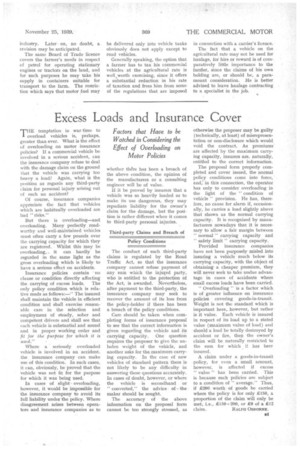Excess Loads and Insurance Cover
Page 27

If you've noticed an error in this article please click here to report it so we can fix it.
Factors that Have to be Watched in Considering the Effect of Overloading on Motor Policies
THE temptation in war-time to
overload vehicles is, perhaps, greater than ever. What is the effect of overloading on motor insurance policies? If a commercial vehicle be involved in a serious accident, can the insurance company refuse to deal with the damage claim on the ground that the vehicle was carrying too heavy a load? Again, what is the position as regards any third-party claim for personal injury arising out of such an accident?
Of course, insurance companies appreciate the fact that vehicles which are habitually overloaded are bad "risks."
But there is overloading—and overloading. Many perfectly, roadworthy and well-maintained vehicles must often carry a few pounds over the carrying capacity for which they are registered. Whilst this may be overloading, it can hardly be regarded in the same light as the gross overloading which is likely to have a serious effect on accidents.
Insurance policies contain ' no clause or condition directly affecting the carrying of excess loads. The only policy condition which is relative reads as follows:—" The insured shall maintain the vehicle in efficient condition and shall exercise reasonable care in the selection and • employment of steady, sober and competent drivers and shall see that each vehicle is substantial and sound and in proper working order and fit for the purpose for which it is used."
Where a seriously overloaded vehicle is involved in an accident, the insurance company can make use of this condition. -In such cases, it can, obviously, be proved that the vehicle was not fit for the purpose for which it was being used.
In cases of slightoverloading, however, it would be impossible for the insurance company to avoid its full liability under the policy. Where disagreement arises between operators and insurance companies as to whether there has been a breach of the above condition, the opinion of the manufacturers or a consulting engineer will be of value.
If it be proved by insurers that a vehicle was so heavily loaded as to make its use dangerous, they may repudiate liability for the owner's claim for the damage, but the position is rather different when it comes to third-party personal injuries.
The conduct of such third-party claims is regulated by the Road Traffic Act, so that the insurance company cannot refuse payment of any sum which the injured party, who is entitled to the protection of the Act, is awarded. Nevertheless, after payment to the third-party, the insurance company may seek to recover the amount of its loss from the policy-holder if there has been a breach of the policy conditions.
Care should be taken when completing forms of insurance proposal to see that the correct information is given regarding the vehicle and its carrying capacity. One question requires the proposer to give the unladen weight of the vehicle, and another asks for the maximum carrying capacity. In the case of new vehicles of standard pattern there is not likely to be any difficulty in answering these questions accurately. In cases of doubt, however, or where the vehicle is secondhand or " converted," the advice of --the maker should be sought.
The accuracy of the above information on the proposal form cannot be too strongly stressed, as otherwise the proposer may be guilty (technically, at least) of misrepresentation or non-disclosure which would void the contract. As premiums
are affected by the maximum carrying capacity, insurers are, naturally, entitled to the correct information.
The proposal form properly completed and cover issued, the normal policy conditions come into force, and,' in this connection, the operator has only to consider overloading in the light of the "condition of vehicle " provision. He has, therefore, no cause for alarm if, occasionally, he carries a load slightly above that shown as the normal carrying capacity. It is recognized by manufacturers nowadays that it is necessary to allow a fair margin between " normal " carrying capacity and " safety limit" carrying capacity.
Provided insurance companies have not been purposely misled into insuring a vehicle much below its carrying capacity, with the object of obtaining a cheaper premium, they will never seek to take undue advantage in cases of accidents where small excess loads have been carried. " Overloading" is a factor which is of greater influence on insurance policies covering goods-in-transit. Weight is not the standard which is important here,. however, but ratheris it value, Each vehicle is insured in respect of its load up to a stated value (maximum value of load) and should a load be totally destroyed by accident or fire, then the owner's claim will be naturally restricted to the sum for which it has beer insured.
A claim under a goods-in-transit policy, for even a small amount, however, is affected if excess " value " has been carried. This is because such policies are subject to a condition of " average." Thus, if 4200 worth of goods be carried where the policy is for only 4150, a proportion of the claim will only be met, i.e., 41504200, or 49 of a 412 RALPH OSBORNE. el






























































